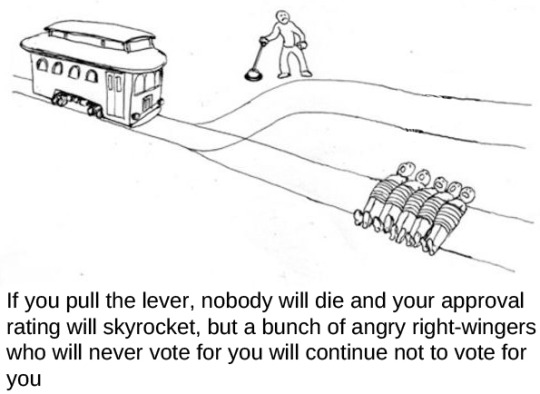#trolley problem
Text

New reaction pic for y'all to be used when you get into an argument about trans healthcare and your opponent starts talking about the 0.8% or whatever of trans people who regret transitioning
#trans healthcare#trans rights are human rights#trans rights#transgender#trans#reaction pic#trolley problem#1k#2k#5k#10k#most popular
40K notes
·
View notes
Text

15K notes
·
View notes
Text
This was a good use of my two hours
11K notes
·
View notes
Text
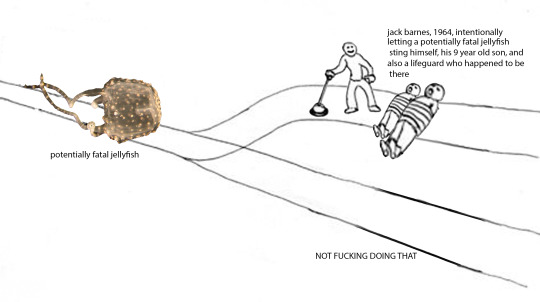
#original coast#irukandji jellyfish#irukandji syndrome#cubozoa#trolley problem#hey everyone guess who learned a little photoshop :3 it was me. i did. and this is what im doing instead of yknow anything important#jellyfish#marine life#sea creatures
5K notes
·
View notes
Text
"The idea of reforming Omelas is a pleasant idea, to be sure, but it is one that Le Guin herself specifically tells us is not an option. No reform of Omelas is possible — at least, not without destroying Omelas itself:
If the child were brought up into the sunlight out of that vile place, if it were cleaned and fed and comforted, that would be a good thing, indeed; but if it were done, in that day and hour all the prosperity and beauty and delight of Omelas would wither and be destroyed. Those are the terms.
'Those are the terms', indeed. Le Guin’s original story is careful to cast the underlying evil of Omelas as un-addressable — not, as some have suggested, to 'cheat' or create a false dilemma, but as an intentionally insurmountable challenge to the reader. The premise of Omelas feels unfair because it is meant to be unfair. Instead of racing to find a clever solution ('Free the child! Replace it with a robot! Have everyone suffer a little bit instead of one person all at once!'), the reader is forced to consider how they might cope with moral injustice that is so foundational to their very way of life that it cannot be undone. Confronted with the choice to give up your entire way of life or allow someone else to suffer, what do you do? Do you stay and enjoy the fruits of their pain? Or do you reject this devil’s compromise at your own expense, even knowing that it may not even help? And through implication, we are then forced to consider whether we are — at this very moment! — already in exactly this situation. At what cost does our happiness come? And, even more significantly, at whose expense? And what, in fact, can be done? Can anything?
This is the essential and agonizing question that Le Guin poses, and we avoid it at our peril. It’s easy, but thoroughly besides the point, to say — as the narrator of 'The Ones Who Don’t Walk Away' does — that you would simply keep the nice things about Omelas, and work to address the bad. You might as well say that you would solve the trolley problem by putting rockets on the trolley and having it jump over the people tied to the tracks. Le Guin’s challenge is one that can only be resolved by introspection, because the challenge is one levied against the discomforting awareness of our own complicity; to 'reject the premise' is to reject this (all too real) discomfort in favor of empty wish fulfillment. A happy fairytale about the nobility of our imagined efforts against a hypothetical evil profits no one but ourselves (and I would argue that in the long run it robs us as well).
But in addition to being morally evasive, treating Omelas as a puzzle to be solved (or as a piece of straightforward didactic moralism) also flattens the depth of the original story. We are not really meant to understand Le Guin’s 'walking away' as a literal abandonment of a problem, nor as a self-satisfied 'Sounds bad, but I’m outta here', the way Vivier’s response piece or others of its ilk do; rather, it is framed as a rejection of complacency. This is why those who leave are shown not as triumphant heroes, but as harried and desperate fools; hopeless, troubled souls setting forth on a journey that may well be doomed from the start — because isn’t that the fate of most people who set out to fight the injustices they see, and that they cannot help but see once they have been made aware of it? The story is a metaphor, not a math problem, and 'walking away' might just as easily encompass any form of sincere and fully committed struggle against injustice: a lonely, often thankless journey, yet one which is no less essential for its difficulty."
- Kurt Schiller, from "Omelas, Je T'aime." Blood Knife, 8 July 2022.
#kurt schiller#ursula k. le guin#quote#quotations#the ones who walk away from omelas#trolley problem#activism#introspection#discomfort#reform#revolution#suffering#ethics#morality
10K notes
·
View notes
Text

2K notes
·
View notes
Text
New chess piece:
THE TROLLEY

A trolley is headed towards all 8 of your pawns. You can pull the lever to change the track and divert the trolley towards the opposing side's pawns, but is it truly ethical to selectively save only those whose ideologies align with yours the most? Is it truly ok for you to decide who should live or die in this situation? Furthermore, would it really be fair to put the opponent at such a disadvantage just because you went first?
7K notes
·
View notes
Text
I've solved the unsolvable trolley problem!
It's simple really.
The eagles take the trolley to mordor
#for non legal reasons this is a joke#lord of the rings#lotr#the trolley problem#trolley problem#may 2023#wreckitremy
2K notes
·
View notes
Text
Trolley Problem (actual)
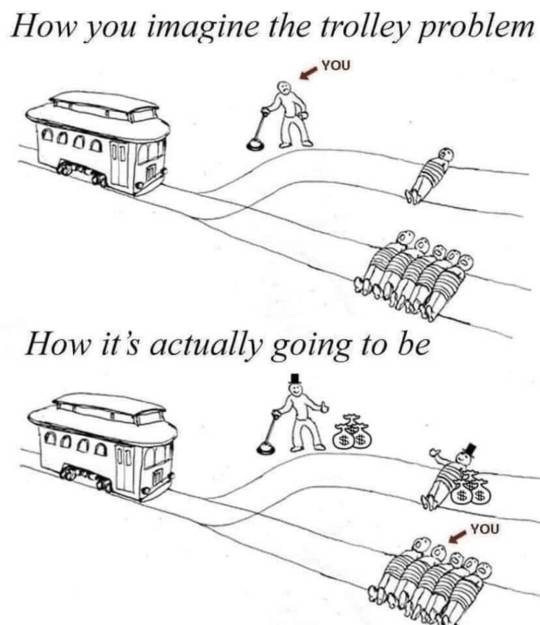
#trolley problem#capitalists have each other's backs#as long as they both profit#and to hell with the rest of us#cartoons
389 notes
·
View notes
Text

543 notes
·
View notes
Text
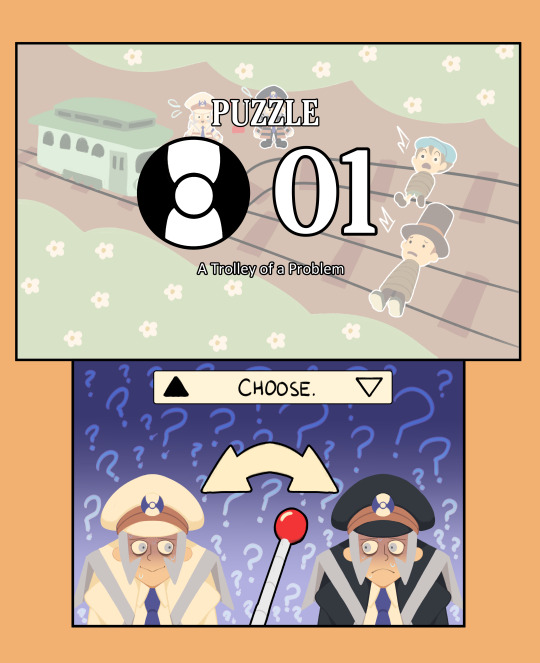
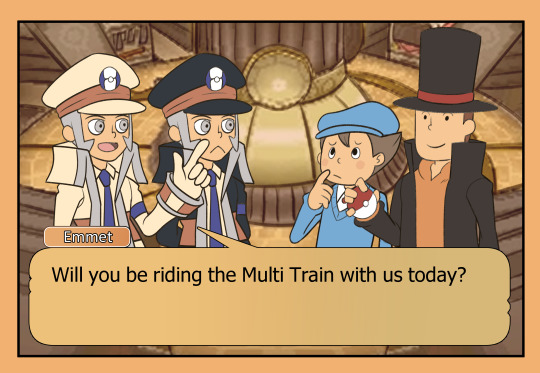

"Oh, hey, funny idea to crossover two niche video games I enjoy," I said. "I will surely just make a funny doodle and not put more effort into this," I said. Oh, how I gaslight, girlkeep, and gateboss myself.
Bonuses under the cut (v)


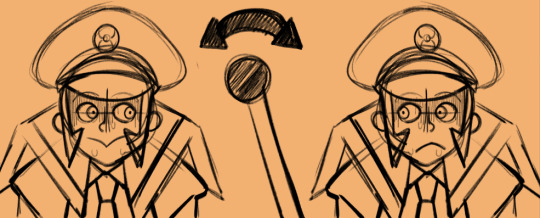
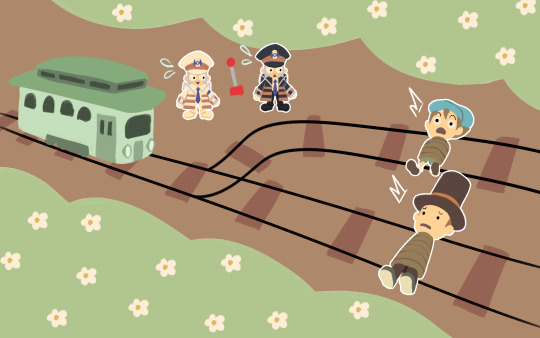
#pkmn#professor layton#emmet#ingo#hershel layton#luke triton#fanart#crossover#submas#sbms#pl#stonjourner#runerigus#sinistea#yamper#applin#greedent#trolley problem#shitpost#at least IT WAS SUPPOSED TO BE#my hands have a will of their own#gladhand art#too much effort into this but MUCH FUN#also lines in the video are pulled form pokemon masters#I like JP voices more but EN felt more fitting to use#rambling
2K notes
·
View notes
Text
The Christmas Kitty has been caught in the Trolley Problem!

Barreling down the tracks is a runaway trolley. The trolley is heading directly for five random people who are tied to the track. On an adjacent track is the Christmas Kitty. As a bystander you have the following options:
Flicking the lever, diverting the trolley onto the second track killing Christmas Kitty
Doing nothing, causing the trolley to kill the five random people
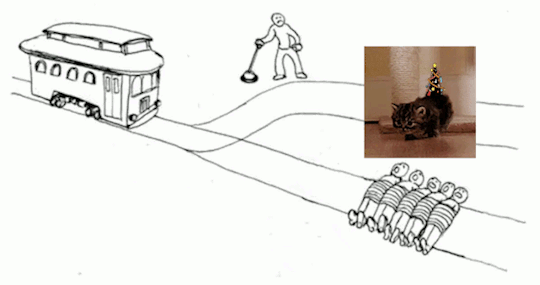
Submission by @sylph-of-gender
326 notes
·
View notes

